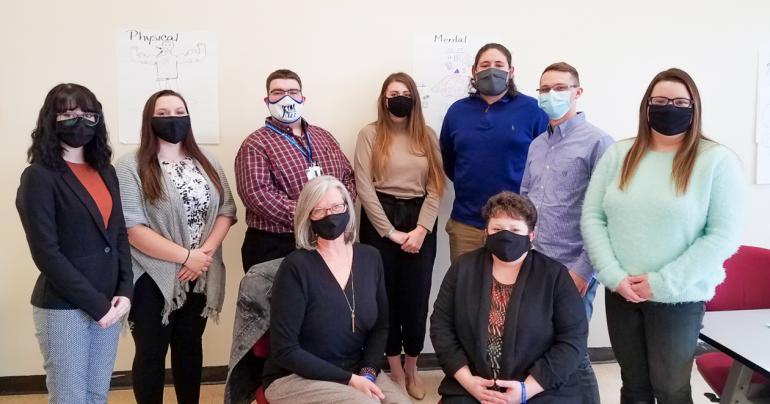
FOR IMMEDIATE RELEASE: March 10, 2021
For More Information:
Glenville State College
Public Relations Department
(304) 462-4115
Glenville, WV – Preservice teachers within the Department of Education at Glenville State College (GSC) recently participated in Youth Mental Health First Aid (YMHFA) training. The day-long course is designed to teach parents, family members, caregivers, teachers, school staff, peers, neighbors, and health and human services workers how to help adolescents (ages 12-18) who are experiencing challenges with mental health or addiction.
Topics addressed within the training include an overview of common mental health challenges for youth, a review of typical adolescent development, and teaches a 5-step action plan for how to help young people in both crisis and non-crisis situations. Topics covered include anxiety, depression, substance abuse, disorders in which psychosis may occur, disruptive behavior disorders (including AD/HD), and eating disorders.
The training was led by YMHFA certified instructors Dr. Grace Wine and Mrs. Barb Tucker. Wine is a GSC graduate and currently teaches English at Gilmer County High School; Tucker is a Region 7 Adolescent Health Initiative Coordinator.
“As educators, we teach the whole child. If the basic needs of a child are not met, our best efforts will fall short,” said Wine. “By understanding common problems, early warning signs, and proper intervention strategies, teachers can become effective “first aid responders” as they are on the front lines meeting the needs of students. As an instructor, I can’t express the importance of this course enough. Not only is it valuable to teachers, but anyone who works with children/teens in any capacity can benefit. Knowledge is power. Knowledge of the early warning signs of mental health issues, how to respond, and where to find support can save lives. You can be the difference,” added Wine.
“For the past six semesters, our preservice teachers have participated in Youth Mental Health First Aid training,” said Associate Professor of Education Connie Stout O’Dell. “This professional development has been extremely valuable for our preservice teachers and our interns and provides an overview of mental health risk factors and warning signs among adolescents. Preservice teachers continually comment on how much they appreciate the hands-on learning and role-playing activities during the training. We hope to continue this professional development with future teacher education majors, and we truly thank the presenters for their time and expertise.”
Activities during the training involve identifying typical adolescent developmental changes in contrast to early warning signs of mental illness, how to appropriately respond to someone experiencing a panic attack, fact vs. fiction about mental illness, auditory hallucination simulation, and talking to someone who has thoughts of suicide.
“I appreciate the opportunity to learn more about helping take care of children's mental health situations during our intern training,” said preservice teacher, Faith Norris. “We were instructed on the importance of gaining trust in order to foster a relationship in which children could ask for help in a time of a crisis in their life. As an early educator, it is my goal to be a light in a time of need for my students.”
For preservice teachers, Bryce McCourt and Haley Cottrill, the training was an eye-opening experience. “[The training] was very informative and gave educators helpful tips that allows them to check on their students who are potentially showing warning signs of a mental illness,” said McCourt. “I am thankful I have the ability to help my future students with their mental health,” said Cottrill.
Participants receive a certificate following their YMHFA training that is valid for up to three years.

